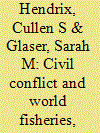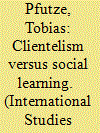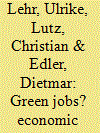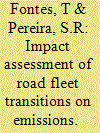|
|
|
Sort Order |
|
|
|
Items / Page
|
|
|
|
|
|
|
| Srl | Item |
| 1 |
ID:
109913


|
|
|
|
|
| Publication |
2011.
|
| Summary/Abstract |
While the negative economic consequences of civil conflict are well known, does civil conflict have sector-specific effects that threaten food and economic security? This article surveys the effects of civil conflict on reported marine and inland fish catch, focusing on the effects of conflict through redeployment of labor, population displacement, counter-insurgency strategy and tactics, and third-party encroachment into territorial waters. Analysis of 123 countries from 1952 to 2004 demonstrates a strong, statistically robust and negative relationship between civil conflict and fisheries, with civil wars (1000+ battle deaths) depressing catch by over 16% relative to prewar levels. The magnitude of this effect is large: the cumulative contraction in total fish catch associated with civil war onset is roughly 13 times larger than the estimated effect of an extraordinarily strong El Niño, the ocean-atmosphere phenomenon associated with global declines in fisheries. Robust evidence of a Phoenix effect is lacking: post-conflict fisheries do not quickly bounce back to prewar catch levels due to more rapid growth. Analysis of conflict episodes indicates that conflict intensity, measured by battle deaths, negatively affects fish catch, while population displacement and conflict proximity to the coast do not. While these findings contribute to the growing literature on the economic effects of civil conflict, they also are important for regional fisheries management organizations, which must increasingly pay attention to sociopolitical factors that dramatically affect the utilization of aquatic resources.
|
|
|
|
|
|
|
|
|
|
|
|
|
|
|
|
| 2 |
ID:
133647


|
|
|
|
|
| Publication |
2014.
|
| Summary/Abstract |
Most research on the effects of international migration on democratic institutions in sending countries focuses on how emigration changes the civic and democratic values of those left behind. Little attention has been given to how the additional income provided by migrant remittances alters the incentive structure of the political actors involved and how this will affect political outcomes. This paper develops a voting model that accounts for the effect of higher income through remittances and shows that its expected effects on voter turnout patterns differ in important ways from those of improved civic values. Taking these predictions to the data, it is shown that, for the case of Mexican municipal elections over the year 2000-2002 period, the empirical evidence strongly supports the notion that international remittances had a positive effect on electoral competitiveness in Mexico by reducing the clientelistic power of the formerly dominant state party (Institutional Revolutionary Party). This result is robust to the use of instrumental variables.
|
|
|
|
|
|
|
|
|
|
|
|
|
|
|
|
| 3 |
ID:
114320


|
|
|
|
|
| Publication |
2012.
|
| Summary/Abstract |
The labor market implications of large investment into renewable energy (RE) are analyzed in this text. Although a growing RE industry can be observed in Germany the overall effect of large increases of RE based electricity and heat generating technologies on the German economy require a careful model based analysis. The applied model PANTA RHEI has been used among others to evaluate the German energy concept in 2010. It takes positive and negative impacts of RE into account. The paper shows the overall effects under different assumptions for fossil fuel prices, domestic installations and international trade. The results are sensitive to assumptions on the development of RE world markets and German exports to these markets. Almost all of these scenarios exhibit positive net employment effects. Under medium assumptions net employment of RE expansion will reach around 150 thousand in 2030. Only with assumptions for German RE exports below today's level, net impacts are slightly negative. Gross employment will increase from 340 thousand in 2009 to between 500 and 600 thousand in 2030.
|
|
|
|
|
|
|
|
|
|
|
|
|
|
|
|
| 4 |
ID:
132609


|
|
|
|
|
| Publication |
2014.
|
| Summary/Abstract |
This paper aims to examine the impacts of fleet composition changes on emission due to the introduction of different road transportation policies in a medium size European country (Portugal) applying an ex-post analysis (e.g. policies based on fuel pricing, car scraping, car taxation). A baseline scenario was compared with a counterfactual scenario in order to understand what would occur in the absence of the introduction of those policies. For each scenario, four approaches were assessed using economic effects and/or human health costs. HC, CO, NOx, PM and CO2 emissions from passenger cars and light duty vehicles were evaluated. The results show high statistical significance (p?0.05) between CO emissions and different vehicle features as vehicle age, fuel type and engine classes. The same pattern was observed between the average vehicle age and HC, NOx and PM. After the implementation of road traffic policies, the average emission factors of the fleet decreased 28-62% for HC, CO, NOx, PM and 20-39% for CO2. However, if a counterfactual scenario would be implemented, the reduction would be 20-80% and 26-55% higher, respectively. The results demonstrates that although were recorded some benefits, the fleet characteristics distribution were more environmental friendly in 2001 than in 2011.
|
|
|
|
|
|
|
|
|
|
|
|
|
|
|
|
|
|
|
|
|